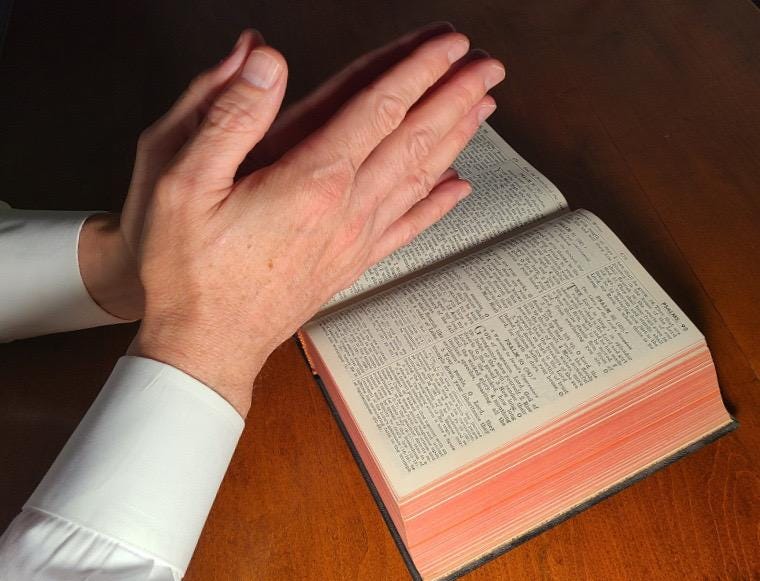Generosity is required in the spiritual life. Why? The journey is often compared to climbing a mountain. When you are starting the journey, the top of the mountain seems far away. The climb looks difficult, even dangerous. How can I possibly make it to the top of this mountain? I am broken. I am a sinner. I don’t know how to pray.
In the face of these perceived difficulties, “generosity relies on trust in God and courageously undertakes to do all that is commanded . . . no matter how difficult.”1 “Each one must do as he has made up his mind, not reluctantly or under compulsion, for God loves a cheerful giver.”2 “Our sole concern should be to give ourselves to God and God alone, whether we receive something or nothing in return. . . . If we are prepared to give our all, so is God.”3
After I returned to the Church, I had much to learn about the Faith. I attended Mass every Sunday. I went to Benediction at a weekly Holy Hour and became familiar with traditional Catholic hymns. I learned how to pray the rosary. I started reading the Bible and books about the Faith. Even though my prayer life was very basic at this time, I was laying a foundation. I was also vigorously fighting the battle against sin and bad habits (more about that below).
After a couple of years, I traveled to Omaha, Nebraska to go on a 4-day silent retreat.4 One significant part of the religious order’s charism was to hold silent retreats for individuals and help guide them into mental prayer. They vigorously interceded in prayer for the retreatants. Each day I was given a list of scripture passages and told to read them, pray about them, and write in my journal about what the Lord was saying to me.
The first day or two were exhausting! It seemed like I spent more time napping and snacking than praying. I did manage to spend time with Jesus in the Blessed Sacrament. As the retreat progressed, there was a breakthrough – I encountered the living God. The rest of the retreat was full of prayer time, getting to know the Lord and His love for me. It seemed like prayer was easy! Little did I know that this “first fervour” was God’s way of fueling my generosity and strengthening me for the challenging journey ahead.

The first conversion is the entrance into the first age of the spiritual life—the purgative way. The purgative way is often marked by sensible consolations in prayer. This is the “milk of consolation” referenced by St. Paul.5 It is also known as the “first fervour.” “First fervour is essential for it is where that primordial desire to love and be loved is set ablaze to support and urge the would-be mystic onwards when the well runs dry. . . . These moments of delight when God makes His presence felt do not last forever, nor are they a reward for perseverance.”6
Alas, in the first fervour one often desires to imitate the penances of the saints or undertake heroic mortifications. Danger! Many have fallen on the wayside as the result of taking on too much. Therefore, “to start, do not give up anything you like and enjoy except when it prevents you from giving quality space and time to God in prayer each day.”7 This is a very demanding practice to implement! But this is the time “to put into practice more formal prayer so that later on you will have in place a regular and practiced pattern of daily prayer.”8
The enthusiasm generated by the first fervour and the consolations given by God prime us to generously undertake the active purification necessary to bring us to the next stage.9 Our love for God leads us to strive to deal with our spiritual “baggage.” Active efforts on our part are required to be purified (in cooperation with God’s grace).
“At first it is incumbent on man to occupy himself chiefly with avoiding sin and resisting his concupiscences. . . . If beginners are generous, they seek, not to excuse themselves, but to correct themselves.”10 This takes place in the active purification of the senses. In this process, we work on overcoming our sensual appetites—lust, gluttony, anger, impatience. We strive to exercise purity of heart, temperance, meekness and patience in order to counter the sinful movements of our unpurified heart. We may need deliverance from evil that has taken hold. We may also need healing from the effects of our sins. Above all, much patience with self is required in this process and trust in the mercy and love of God who desires to make us holy.
After I encountered God in prayer on my retreat in Omaha many years ago, I also experienced the healing and deliverance power of Jesus. Jesus not only saved me, but he also set me free.
During the years leading up to the retreat, I had to go to confession frequently because I was battling habitual mortal sin. Quite frankly, it was humiliating and depressing to continually fall over and over again. It was as if I could not control myself, even though I knew it was wrong. I prayed and prayed to be set free. I also had an addiction to chewing tobacco that I absolutely could not kick. The nicotine addiction happens to run parallel to my habitual mortal sin problem, so I use it to tell the story.
I was introduced to chewing tobacco when I was 14 yrs old at summer camp. The older boys liked to give the new campers some tobacco and then watch them throw up. I did not throw up—I became addicted. I continued to use tobacco in high school, college and law school. After I was married and started practicing law, I continued to use tobacco. I tried to quit off and on, but it was after we had our son that I became seriously conflicted about continuing to use tobacco. I discovered, however, that I could not quit—it had become a physical and spiritual compulsion. I would try to quit all day at work, and then find myself driving to the store at 9pm to buy another can! When I left to go on my silent retreat in Omaha, I left home without any tobacco, determined to quit.
One day during the retreat, I went to confession. The priest was an exorcist. As I discussed my habitual mortal sin problem, he explained to me that sometimes these compulsive sins can be demonic in origin. He explained that he could say a binding prayer over me, to “bind up” any demons behind the problem, and give me an opportunity to grow in prayer and virtue without constantly battling this sin. Even if the problem was not demonic, there was no harm in him saying the prayers. I agreed, and Father prayed over me. The retreat continued.
That evening, with the entire group of brothers and sisters in the religious community, the Mother Superior asked me what I wanted them to pray for when they prayed over me. One specific intention I had was to be able to quit chewing tobacco – to be set free from this addiction. She asked me “do you really want to quit?” (I thought this was a silly question.) She explained to me that many people ask them for help to quit smoking, but then start again. She had learned through prayer and experience that the person truly needed to want to quit. In her words, “If God were to answer your prayer and completely take it away, would you be ok with that? Are you ready to quit?” I answered yes, I was ready to quit. They prayed over me. The retreat continued.
The next day, I was taking a long walk around the neighborhood. I saw something hanging from a tree in my path. Impaled on a tree at eye level was a can of Skoal chewing tobacco. Honest!
I went home after the retreat and have never had the urge for tobacco again. That was over 25 years ago. By the way, I did not have to confess the habitual mortal sin ever again. Thank you Jesus!
These are the realities that we encounter when we embark on the journey of the Christian spiritual life. In order to address our sins and “baggage” we need to pray that God would show us what to work on.11
We should take advantage of the consolations and lights that God is giving us—not for the pleasure they give us, but for wisdom and strength to enter into the battle with sin, self and Satan. Jesus is the one who heals, delivers and saves us—by His wounds we are healed.12 As we reflect on the scriptures about His ministry of healing, deliverance and forgiveness from sin, we too can ask the Lord Jesus to touch us with His power. We can petition Him to make us whole again. And He can and will do it.
My prayer for you today is that the Holy Spirit would enlighten you on the areas in your life where you still need purgation from sin and “spiritual baggage.” As you confront those areas in your prayers, I pray to God the Father in the mighty Name of Jesus that He would minister healing, deliverance and forgiveness to you in those areas in the power of the Holy Spirit! Amen.
Additional Reading:
Power Tools for Prayer, Chapter 2 (Intention).
The Three Ages of the Spiritual Life: Prelude of Eternal Life (frequently cited in footnotes), Mortification According to St. Paul and the Reasons for Its Necessity, pp. 285-298, Sins to be Avoided Their Roots and Their Consequences, pp. 299-313, Active Purification of the Senses, pp. 332-341.
Scriptures:
Isaiah 53:5; Mark 5:25-34; Mark 2:1-12; Luke 19:1-10; Luke 7:36-50; Mark 9:14-29; John 11:17-27; Isaiah 52:13 - 53:12.
Eric A. Welter is an employment lawyer and trial attorney with a long-time devotion to intercessory prayer. He is a Catholic Christian who has been involved with intercessory and healing prayer ministry for over twenty years. The Abound in Hope Ministry website is https://www.aboundinhope.org/ministry.
Garrigou-Lagrange, The Three Ages of the Spiritual Life: Prelude of Eternal Life, at p. 274.
2 Cor. 9:7. Bible quotations are from the RSV-CE unless otherwise indicated.
David Torkington, The Primacy of Loving.
I previously shared the story of my retreat in the recorded talk “Tell them how much the Lord has done for you.”
Primacy of Loving.
Id.
Id.
Three Ages, at 270 (“The spiritual age of beginners is marked by love of God manifesting itself by the struggle to flee sin.”).
Id., at 267.
Id., at 304 (“We must ask for divine light to see our soul a little as God Himself sees it, to see our day that has just ended somewhat as it is written in the book of life.”).






